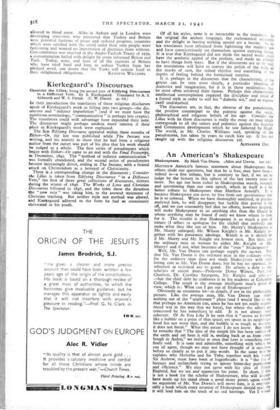Kierkegaard's Discourses
Consider the Lilies, being the second part of Edifying Discourses in a Different Vein. By S. Kierkegaard. Translated by A. S. Aldworth and W. S. Fernie. (C. W. Daniel. 4s. 6d.)
IN their introduction the translators of these religious discOurses speak of Kierkegaard's work as falling into two groups—the dis- courses and " indirect impartation " (and if we must have the cumbrous terminology, " communication " is perhaps less cryptic). The translators could with advantage have expanded their note. The discourses might perhaps awaken more • interest if their place in Kierkegaard's work were explained.
The first Edifying Discourse appeared within three months of Either—Or, the last was published while The Instant was writing, and his anxiety to show that he had been a religious author from the outset was part of his plea that his work should be judged as a whole. The first series of pseudonyms which began with Either—Or came to an end with the Final Postscript, in December, 1845. The " method of indirect communication " was formally abandoned, and the second series of pseudonyms became increasingly direct, ending in The Instant, with a frontal attack on Christendom as a betrayal of Christianity.
There is a corresponding change in the discourses ; Consider the Lilies is taken from Edifying Discourses " in a Different Vein," the first of three great collections of discourses, written during the winter of 1846. The Works of Love and Christian Discourses followed in 1847, and the titles show the direction the " new vein " was taking him, to the avowed statement of Christian teaching. But neither style nor method was altered, and Kierkegaard adhered to the form he had so consciously elaborated in his youth. Of all his styles, none is so intractable to the translator. In the original the archaic language, the ecclesiastical solemnity and the delight in leaving nothing unsaid are a barrier. So far his translators have refrained from lightening the reader's task and have conscientiously set themselves against currying favour. It is true that Kierkegaard did not think the sacred works could have the aesthetic appeal of the profane, and made no attempt to have things both ways. But if the discourses are to be read, the translations will have to convey the polish of the style, all the marks of care, the stilted rhythm and something of the depths of feeling behind the formalised exterior.
It is perhaps in the discourses that the characteristic of his genius can be seen most clearly, a particular blending of dialectics and imagination, for it is in these meditations that he most often achieved their fusion. Perhaps this characteristic intellectual contemplation required the discipline and ritual of a formal style in order to still his " diabolic wit," and so express itself. undisturbed.
The discourses are, in fact, the obverse of the pseudonyms, the positive counterpart to the polemic against the social, philosophical and religious beliefs of his age. Consider the Lilies with its three discourses is really the essay on man which corresponds to all the satires and polemics against the Socialist and Communist development which he saw fathered by Hegel. The world, as Mr. Charles Williams said, speaking of the pseudonyms, has taken 7o years to catch him up. It has not caught up with the religious discourses yet.
ALEXANDER DRU.






































 Previous page
Previous page